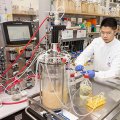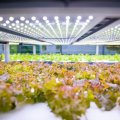University of Queensland undergraduate engineering students will apply their innovation and skills to ensure a floating village in South East Asia has access to a sanitary waste management system.
The project is being conducted as part of 2011’s Year of Humanitarian Engineering and the Make it So campaign.
The Tonle Sap is a combined lake and river system of major importance to Cambodia.
As the largest freshwater lake in South East Asia, Tonle Sap is home to a number of communities who live in floating villages on and around it, who do not have access to appropriate lavatory facilities.
This has resulted in widespread contamination of the lake and a range of health issues affecting locals within the region.
In collaboration with Engineers Without Borders, UQ’s Innovate Team (UQIT), consisting of five engineering students, intend to rectify this situation through the development of a floating bio-digester which will enable local communities to produce useable methane gas and fertilizer from their sanitary waste.
Senior Lecturer Dr Timothy Nicholson said that the Make it So Campaign, in conjunction with courses undertaken at UQ, had allowed students to work on the conceptual design of a new cutting-edge engineering product in multidisciplinary teams.
“The bio-digester project involves students in both technical and business oriented aspects of development such as: clarification of customer requirements; formal product specifications; cost estimation and risk assessment methods; project management plans and business skills,” Dr Nicholson said.
The Make it So Campaign began as a competition in 2010, allowing people to share their visions about what they wanted to see “made so” by engineering teams.
UQ’s bio-digester project is a direct result from an idea which was submitted during last year’s Make it So Campaign.
Bachelor of Mechanical Engineering student and UQIT Operations Manager Mr Daniel Gillick said that the Make it So campaign was a great opportunity for the participating students to sharpen the skills they had learned in the classroom and improve the lives of others.
“Conventional engineering projects are commercially motivated, with heavy interests on generating return," Mr Gillick said.
“Shifting the focus towards humanitarian engineering that is community oriented has been an insightful and rewarding challenge.”
Media: Dr Timothy Nicholson (t.m.nicholson@uq.edu.au or 3365 4081) or Madelene Flanagan (m.flanagan@uq.edu.au or 3365 8525)
.jpg)









